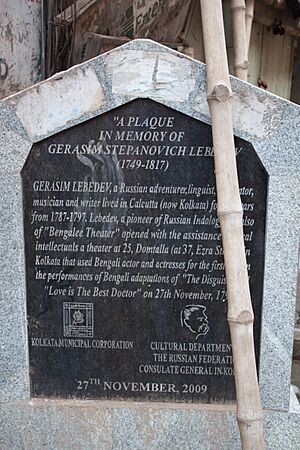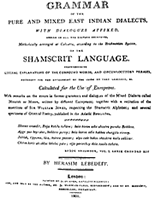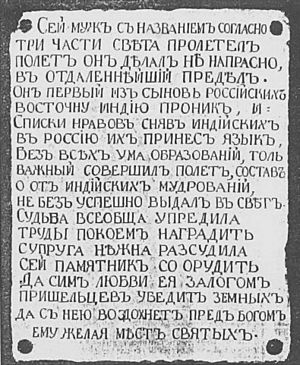Gerasim Lebedev facts for kids
Gerasim Stepanovich Lebedev (Russian: Гера́сим Степа́нович Ле́бедев; 1749 – July 27, 1817) was a Russian adventurer, linguist, and musician. He is famous for being a pioneer of Bengali theatre, starting the first European-style theatre in India in 1795. He was also a translator and writer, and a very early expert in Indology, which is the study of Indian history, languages, and cultures.
Contents
Who Was Gerasim Lebedev?
Gerasim Lebedev was born in 1749 in Yaroslavl, Russia. His father was a choirmaster at a church. Gerasim was the oldest of four children. His family later moved to Saint Petersburg, where his father continued to work in a church.
Learning and Music
Lebedev was very good at learning on his own. He taught himself English, French, and German. In Saint Petersburg, he met Fyodor Volkov, who started Russia's first permanent theatre. Lebedev was a singer in the court choir and also acted in Volkov's plays.
He also taught himself to play the violin. He traveled across Europe as a violinist, earning money by playing music. He then joined an English military band that was going to India.
Journey to India
Lebedev arrived in Madras (now Chennai) in southern India in August 1785. The mayor of Madras welcomed him, and he earned money from his musical performances. However, he found the society there a bit too strict. After staying in Madras for a couple of years, he decided to move to Bengal.
Life in Calcutta
Lebedev lived in Calcutta (now Kolkata) for about ten years. Calcutta was the capital of British India at that time. During his stay, he became very interested in Indian languages and culture.
Learning Indian Languages
He began to learn Hindi, Sanskrit, and Bengali from a local teacher named Golokhnath Das. In return, Lebedev taught Das how to play the violin and about European music. With help from a Russian doctor in Calcutta, Lebedev became a well-known musician. People paid about 12 rupees to attend his musical shows. He was the first person to use Indian tunes with Western musical instruments.
Starting the First Indian Theatre
With support from local thinkers, Lebedev opened the first European-style theatre in India. This theatre opened in Calcutta in 1795. He translated two plays into Bengali: Love is the Best Doctor and The Disguise. These were the first plays performed at his theatre. Lebedev even wrote the music for the plays, using lyrics from the Bengali poet Bharatchandra Ray.
Lebedev's theatre was special because it was the first to use Bengali actors and actresses. The first show on November 27, 1795, is seen as the start of modern Indian theatre. At that time, there were only two theatres in Calcutta for English people. Lebedev's theatre became very popular. This success made some Englishmen jealous, and sadly, two of them burned down his theatre. Even though his theatre was destroyed, Lebedev showed that there were people in the city who wanted to pay to see public performances.
Writing and Challenges
Lebedev also created a small Bengali dictionary and wrote a book on arithmetic in Bengali. He even translated part of a famous Bengali poem, Annadamangal, into Russian. His dictionary was published in 1801. He wanted to publish Bharatchandra Ray’s works in Russia and wrote to the Russian ambassador in London about it.
However, the British government in India did not support Lebedev's work. They were annoyed by his friendly attitude towards Indians. He also lost a court case against a theatre decorator, which left him with no money. Because of these problems, the British authorities made him leave India in 1797. He had very little money left, only about 295 rupees worth of belongings. He had to stay in Cape Town for a few months to earn enough money for his ticket back to Europe.
Return to Russia
On his way back to Russia, Lebedev stopped in London. There, he published a book called Grammar of the Pure and Mixed East Indian Languages. This book was based on his studies of Indian languages, where they came from, and how they were related to Asian and European languages.
When he returned to Russia, he got a job with the Foreign Ministry. He set up a printing house in St. Petersburg. This printing house was the first in Europe to have Devanāgarī and Bengali scripts. He published his second book, Unbiased observations on Brahmin customs. He was working on two more books but could not finish them because he became ill.
Gerasim Lebedev passed away in his printing house on July 27, 1817. He was buried in the Gergiev Cemetery in Saint Petersburg.
Major Works
- A Grammar of the Pure and Mixed East Indian Dialects (London, 1801)
- An Impartial Contemplation of the East Indian Systems of Brahmins (St Petersburg, 1805)
- A Collection of Hindustani and Bengali Arias
See also
- Hindu Theatre
 | Toni Morrison |
 | Barack Obama |
 | Martin Luther King Jr. |
 | Ralph Bunche |




